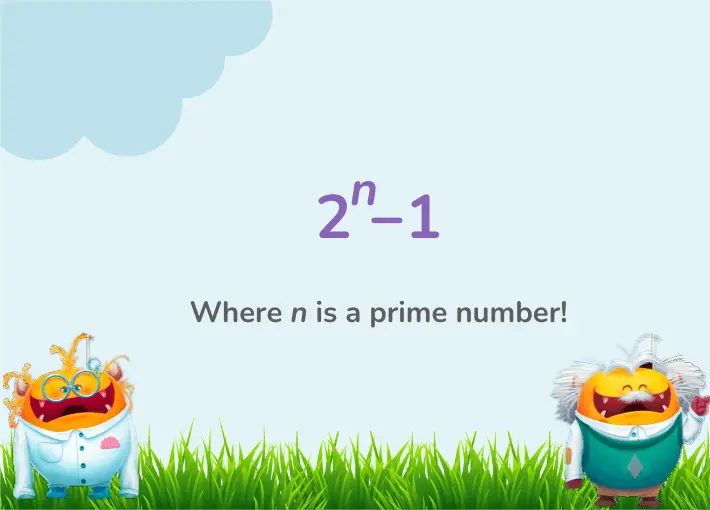Is 2 A Prime Number?
Prime vs. Composite Numbers
Greetings, young math enthusiasts! Today, let’s set sail on a mathematical voyage to determine if 2 is a prime number, and learn more about the difference between prime and composite numbers.

Exploring the World of Mersenne Prime Numbers
Imagine unlocking a secret door to a world where numbers hold ancient mysteries and modern marvels. Enter the realm of Mersenne numbers, named after the brilliant 17th-century monk Marin Mersenne. These numbers, written as 2n−1, have intrigued mathematicians for centuries with their unique properties and profound connections to prime numbers.


No credit card required

No credit card required
What are Mersenne Prime Numbers?
What are Mersenne Primes Used For?
How Do You Know if a Number is a Mersenne Prime?
Difference Between a Mersenne Prime and a Mersenne Number
What is Great Internet Marsenne Prime Search?
List of Known Mersenne Primes
What are the First 7 Mersenne Primes?
How Many Known Prime Numbers Are There?
In this captivating journey, mathematicians and enthusiasts alike harness the power of computers to uncover these special numbers, revealing secrets that push the boundaries of number theory.
Whether you’re a math enthusiast or just curious, Mersenne numbers offer a fascinating glimpse into the endless wonders of mathematics. Join us as we explore their history, applications, and the thrill of discovering new Mersenne primes!
What are Mersenne Prime Numbers?

Have you ever heard about prime numbers? They are special numbers that can only be divided by 1 and themselves, like 2, 3, 5, and 7. But there’s a special kind of prime number called a Mersenne prime. These are named after a French monk and mathematician named Marin Mersenne, who studied these numbers a long time ago.
A Mersenne prime is a prime number that is one less than a power of 2. This means it looks like this: 2n−1. Here, n is an exponent, and the result is a Mersenne number. If this Mersenne number is also a prime number, then it’s called a Mersenne prime. For example, let’s take n=3:
23−1 = 8−1 = 7
Since 7 is a prime number, this means 7 is a Mersenne prime. But not all Mersenne numbers are primes. If we take n=4:
24−1 = 16−1 = 15
And 15 is not a prime number because it can be divided by 3 and 5. So, 15 is not a Mersenne prime. Mersenne primes are special and rare, and they become much harder to find as the numbers get bigger. The largest known prime number is often a Mersenne prime.
What are Mersenne Primes Used For?
You might be wondering, “Why do we care about Mersenne primes?” Well, they are very important in mathematics and computer science for several reasons.
Cryptography
Mersenne primes are used to create strong encryption keys that keep our online information safe. This is because large prime numbers are hard to factor, making it tough for hackers to break the codes.
Perfect Numbers
There’s a cool connection between Mersenne primes and perfect numbers. A perfect number is a number that equals the sum of its proper divisors (excluding itself). For example, 6 is a perfect number because its divisors are 1, 2, and 3, and 1 + 2 + 3 = 6.
It turns out that every even perfect number can be written as 2(n−1)×(2n−1), where 2n−1 is a Mersenne prime. This means Mersenne primes have a close connection to perfect numbers.
Mathematical Research
Mersenne primes help mathematicians explore the properties of prime numbers and develop new theories in number theory. Finding new Mersenne primes is a big challenge and often requires the use of powerful computers. The search for Mersenne primes has led to the discovery of many Mersenne primes and the development of new primality tests.
How Do You Know if a Number is a Mersenne Prime?

To determine if a number is a Mersenne prime, we follow a few steps:
Check the Form
The number must be one less than a power of 2. This means it should look like 2n−1.
Verify the Exponent
The exponent n must be a prime number. For example, if n is 4, 24−1=15 is not a Mersenne prime because 4 is not a prime number.
Check for Primality
Finally, check if the resulting number 2n−1 is a prime number. This can be done using various primality tests, such as the Lucas-Lehmer test, which is a simple test for determining if a Mersenne number is prime.
Let’s go through an example. Suppose we want to check if 25−1 is a Mersenne prime:
Form: 25−1
Exponent: 5 (which is a prime number)
Result: 25−1=32−1=31. Is 31 a prime number? Yes, it is!
So, 25−1=31 is a Mersenne prime.
Difference Between a Mersenne Prime and a Mersenne Number
Let’s break it down simply!
Mersenne Number
A Mersenne number is a number that looks like this: 2n−1. Here, n is any positive integer. So, you take 2, raise it to the power of n, and then subtract 1. For example, if n=4:
24−1=16−1=15
So, 15 is a Mersenne number.
Mersenne Prime
A Mersenne prime is a special type of Mersenne number. For a Mersenne number to be a Mersenne prime, it has to be a prime number. A prime number can only be divided by 1 and itself. For example, if n=3:
23−1=8−1=7
Since 7 is a prime number, it means 7 is a Mersenne prime.
Key Differences
Mersenne Number: Can be any number in the form 2n−1.
Mersenne Prime: Must be a Mersenne number that is also a prime number.
So, all Mersenne primes are Mersenne numbers, but not all Mersenne numbers are Mersenne primes!
What is Great Internet Marsenne Prime Search?

The Great Internet Mersenne Prime Search (GIMPS) is a project where people from all over the world use their computers to find new Mersenne prime numbers. Mersenne primes are special primes that look like 2n−1. The project started in 1996 and has found many of the largest known primes. By joining GIMPS, anyone can help search for these big numbers.
All you need is a computer and the special software from their website. This project helps scientists and mathematicians learn more about prime numbers. It’s a great way to be part of a big math discovery!
List of Known Mersenne Primes
Now, let’s look at some known Mersenne primes. There are only a few of them compared to regular prime numbers because they are rare and harder to find. Here’s a brief history of the investigations on Mersenne numbers and the latest immense primes discovered.
What are the First 7 Mersenne Primes?
The first seven Mersenne primes are:
22−1=3
23−1=7
25−1=31
27−1=127
213−1=8191
217−1=131071
219−1=524287
How Many Known Prime Numbers are There?
As of now, there are 51 known Mersenne prime numbers. These special primes have been discovered over many years, with significant contributions from the Great Internet Mersenne Prime Search program. GIMPS, a collaborative effort involving thousands of volunteers using distributed computing, has discovered many of the largest known Mersenne primes since its inception in 1996.
Mersenne primes are prime numbers of the form 2n−1, where n is also a prime number. The discovery of new Mersenne primes is a challenging task that requires powerful computers and sophisticated algorithms. One of the most recent discoveries, the 51st known Mersenne prime, is 282,589,933−1, which has over 24 million digits and was found in December 2018 by Patrick Laroche, a volunteer from Florida (Wikipedia) (Mersenne.org).
These discoveries not only contribute to mathematical research but also have practical applications, such as in cryptography, where large prime numbers are essential for creating secure encryption keys. The search for Mersenne primes continues, and anyone with a computer can join GIMPS to potentially find the next Mersenne prime.
Is 31 a Mersenne Prime?
We’ve already gone through this example, but let’s review it. To check if 31 is a Mersenne prime, we need to find if it can be written as 2n−1.
25−1=31
Since 5 is a prime number and 31 is also a prime number, 31 is indeed a Mersenne prime. In fact, the 51st known Mersenne prime was found using a similar method.
Is 63 a Mersenne Prime?
To check if 63 is a Mersenne prime, we need to see if it can be written as 2n−1.
26−1=63
But 6 is not a prime number. So, even though 63 is a Mersenne number, it is not a Mersenne prime because 6 is not a prime.
Is 255 a Mersenne Prime?
Let’s check if 255 is a Mersenne prime by seeing if it can be written as 2n−1.
28−1=255
Here, 8 is not a prime number. Therefore, 255 is not a Mersenne prime. It is just a Mersenne number.
Is 0 a Mersenne Number?
0 is an interesting number, but it cannot be a Mersenne number. Remember, a Mersenne number is always in the form 2n−1 and can never equal 0 for any positive integer value of n. So, 0 is not a Mersenne number.
Conclusion
Mersenne primes are a fascinating and special category of prime numbers that have intrigued mathematicians for centuries. Named for the French mathematician Marin Mersenne, these primes are one less than a power of 2 and are used in various fields, from cryptography to theoretical mathematics. The search for Mersenne primes has led to the discovery of many Mersenne primes and the development of new theories in number theory.
Understanding Mersenne primes helps us appreciate the beauty and complexity of numbers. Whether you’re a young student just starting to explore math or a seasoned mathematician, Mersenne primes offer endless opportunities for discovery and learning. So next time you see a number like 31 or 127, you’ll know there’s something very special about it!
Keep exploring the world of numbers, and who knows, maybe one day you’ll discover a new Mersenne prime! The search for Mersenne primes continues, and you can even join projects like the Great Internet Mersenne Prime Search (GIMPS) to help find the next Mersenne prime. With the help of distributed computing and the efforts of many mathematicians, the list of known Mersenne primes will keep growing.
Is 49 a Semiprime Number?
A semiprime number is a composite number formed by the product of exactly two prime numbers.
49 fits this definition because it is the product of the prime number 7 multiplied by itself:
49=7×7
Thus, 49 is a semiprime number.
Learn More About Prime Numbers
© 2024 Smartick. All Rights Reserved.
